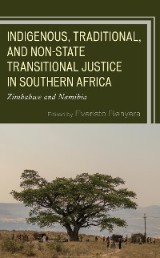Details

Indigenous, Traditional, and Non-State Transitional Justice in Southern Africa
Zimbabwe and Namibia|
36,99 € |
|
| Verlag: | Lexington Books |
| Format: | EPUB |
| Veröffentl.: | 13.09.2019 |
| ISBN/EAN: | 9781498592833 |
| Sprache: | englisch |
| Anzahl Seiten: | 240 |
DRM-geschütztes eBook, Sie benötigen z.B. Adobe Digital Editions und eine Adobe ID zum Lesen.
Beschreibungen
<span>The book investigates the use of bottom-up, community based healing and peacebuilding approaches, focusing on their strengths and suggesting how they can be enhanced. The main contribution of the book is an ethnographic investigation of how post-conflict communities in parts of Southern Africa use their local resources to forge a future after mass violence. The way in which Namibia’s Herero and Zimbabwe’s Ndebele dealt with their respective genocides is a major contribution of the book.<br><br><br>The focus of the book is on two Southern African countries that never experienced institutionalized transitional justice as dispensed in post-apartheid South Africa via the famed Truth and Reconciliation Commission. We answer the question: how have communities healed and reconciled after the end of protracted violence and gross human rights abuses in Zimbabwe and Namibia? We depart from statetist, top-down, one-size fits all approaches to transitional justice and investigate bottom-up approaches.</span>
<span>This book explores indigenous and traditional, non-state transitional justice mechanisms used in two South African countries where there were no formal transitional justice mechanisms after protracted violence. It details how communities delve into their history and modes of everyday living in order to resolve conflict and achieve reconciliation. </span>
<span>Chapter 1: Transitology, Transitional Justice and Transformative Justice</span>
<br>
<br>
<span>Everisto Benyera</span>
<br>
<br>
<br>
<br>
<span>Chapter 2: A Dozen Transitional Justice Realities and Some Preliminary Problematisation</span>
<br>
<br>
<span>Everisto Benyera</span>
<br>
<br>
<br>
<br>
<span>Chapter 3: The Case for Indigenous, Traditional and Non-State Transitional Justice</span>
<br>
<br>
<span>Everisto Benyera</span>
<br>
<br>
<br>
<br>
<span>Chapter 4: Construing Transitology in the Context(s) of Democratization, Transitional Justice and Decolonization in Africa: A Legal Anthropology Perspective</span>
<br>
<br>
<span>Tapiwa Warikandwa & Artwell Nhemachena</span>
<br>
<br>
<br>
<br>
<span>Chapter 5: Operation Murambatsvina, Transitional Justice & Discursive Representation in Zimbabwe</span>
<br>
<br>
<span>Umali Saidi</span>
<br>
<br>
<br>
<br>
<span>Chapter 6: ‘Healing the Dead’ in Matabeleland, Zimbabwe: Combining Tradition with Science to Restore Personhood after Massacres</span>
<br>
<br>
<span>Shari Eppel</span>
<br>
<br>
<br>
<br>
<span>Chapter 7: The Aftermath of Gukurahundi: Dealing with Wounds of the Genocide through Non-State Justice Processes in Bubi (Inyathi) and Nkayi Districts, Matabeleland North Province, Zimbabwe</span>
<br>
<br>
<span>Ruth Murambadoro and Chenai Matshaka</span>
<br>
<br>
<br>
<br>
<span>Chapter 8: Grassroots Mechanisms for Justice, Peace-building and Social Cohesion in Zimbabwe’s ‘New’ Farm Communities</span>
<br>
<br>
<span>Tom Tom and Clement Chipenda</span>
<br>
<br>
<br>
<br>
<span>Chapter 9: Young women in peacebuilding and development in Zimbabwe: The case of Zimbabwe Young Women’s Network for Peacebuilding in Mutoko</span>
<br>
<br>
<span>Patience Thauzeni and Torque Mude</span>
<br>
<br>
<br>
<br>
<span>Chapter 10: Stains on the Wall: Struggle to survive post genocide violence by Nama- Herero communities in Namibia</span>
<br>
<br>
<span>Tafirenyika Madziyauswa</span>
<br>
<br>
<br>
<br>
<span>Chapter 11: Uncharted Waters: Reparations through Indigenous Forms of Transitional Justice for Namibian Victims of a colonial Genocide</span>
<br>
<br>
<span>Christian Harris</span>
<br>
<br>
<span>Everisto Benyera</span>
<br>
<br>
<br>
<br>
<span>Chapter 2: A Dozen Transitional Justice Realities and Some Preliminary Problematisation</span>
<br>
<br>
<span>Everisto Benyera</span>
<br>
<br>
<br>
<br>
<span>Chapter 3: The Case for Indigenous, Traditional and Non-State Transitional Justice</span>
<br>
<br>
<span>Everisto Benyera</span>
<br>
<br>
<br>
<br>
<span>Chapter 4: Construing Transitology in the Context(s) of Democratization, Transitional Justice and Decolonization in Africa: A Legal Anthropology Perspective</span>
<br>
<br>
<span>Tapiwa Warikandwa & Artwell Nhemachena</span>
<br>
<br>
<br>
<br>
<span>Chapter 5: Operation Murambatsvina, Transitional Justice & Discursive Representation in Zimbabwe</span>
<br>
<br>
<span>Umali Saidi</span>
<br>
<br>
<br>
<br>
<span>Chapter 6: ‘Healing the Dead’ in Matabeleland, Zimbabwe: Combining Tradition with Science to Restore Personhood after Massacres</span>
<br>
<br>
<span>Shari Eppel</span>
<br>
<br>
<br>
<br>
<span>Chapter 7: The Aftermath of Gukurahundi: Dealing with Wounds of the Genocide through Non-State Justice Processes in Bubi (Inyathi) and Nkayi Districts, Matabeleland North Province, Zimbabwe</span>
<br>
<br>
<span>Ruth Murambadoro and Chenai Matshaka</span>
<br>
<br>
<br>
<br>
<span>Chapter 8: Grassroots Mechanisms for Justice, Peace-building and Social Cohesion in Zimbabwe’s ‘New’ Farm Communities</span>
<br>
<br>
<span>Tom Tom and Clement Chipenda</span>
<br>
<br>
<br>
<br>
<span>Chapter 9: Young women in peacebuilding and development in Zimbabwe: The case of Zimbabwe Young Women’s Network for Peacebuilding in Mutoko</span>
<br>
<br>
<span>Patience Thauzeni and Torque Mude</span>
<br>
<br>
<br>
<br>
<span>Chapter 10: Stains on the Wall: Struggle to survive post genocide violence by Nama- Herero communities in Namibia</span>
<br>
<br>
<span>Tafirenyika Madziyauswa</span>
<br>
<br>
<br>
<br>
<span>Chapter 11: Uncharted Waters: Reparations through Indigenous Forms of Transitional Justice for Namibian Victims of a colonial Genocide</span>
<br>
<br>
<span>Christian Harris</span>
<span>Everisto Benyera</span>
<span> is associate professor of African politics at the University of South Africa in Pretoria.</span>
<span> is associate professor of African politics at the University of South Africa in Pretoria.</span>
Diese Produkte könnten Sie auch interessieren:

La participación de las víctimas en la JEP y sus efectos restauradores

von: Paula Valencia Cortés, Paola Molano Ayala

7,49 €
















